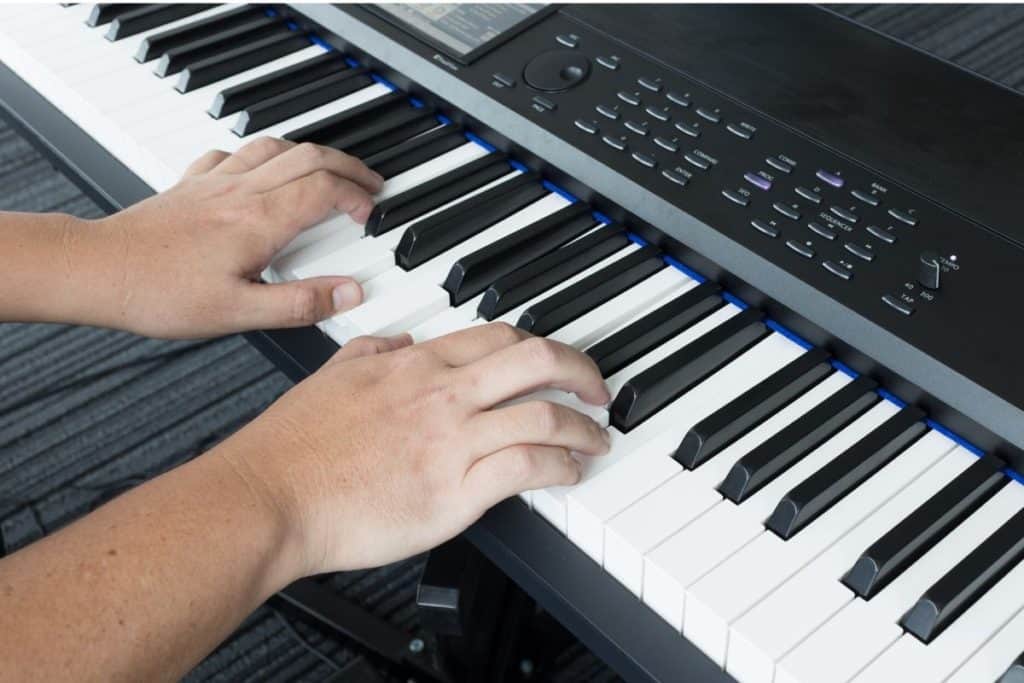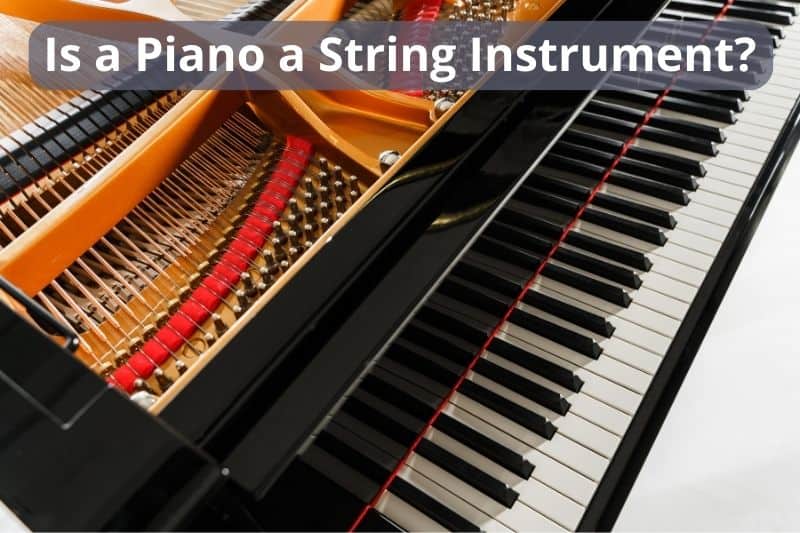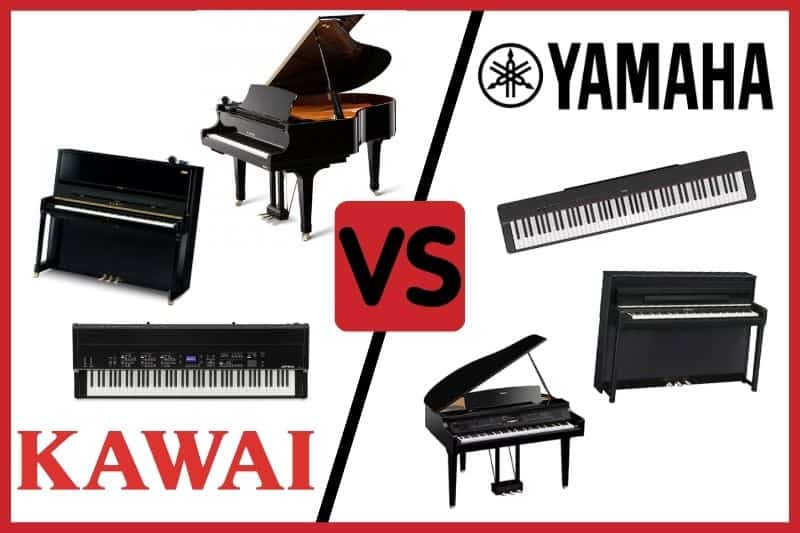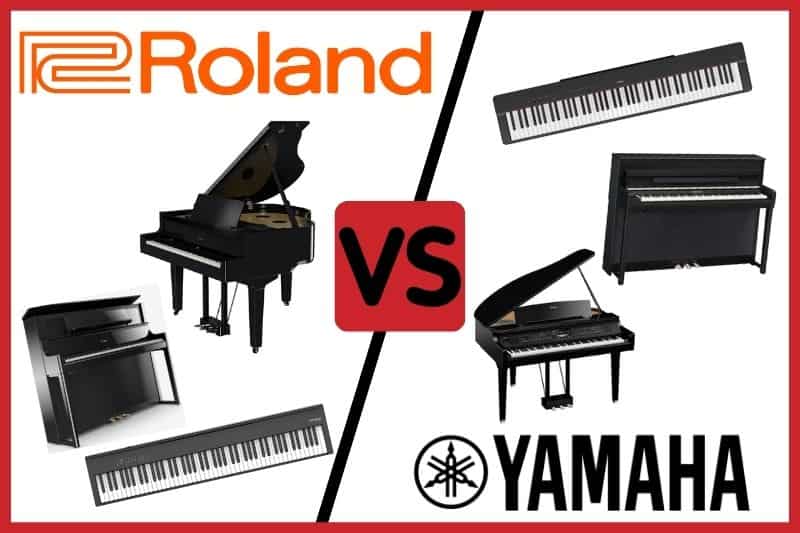
For pianists, the decision to buy any piano is not one to be made lightly. This is especially true for beginners who want to get good value for money and still pick the right piano type that will help them achieve their dreams—be it an electric or acoustic model.
Electric pianos are good alternatives to acoustic models. Electric and digital piano technology has come a long way in the last few decades. It will take a highly experienced pianist to distinguish between pieces played on an acoustic or digital/electric piano in one listen.
The rest of this article will explain how electric pianos work, what playing one feels like, how to choose the perfect model for you, a selection of some high-quality electric pianos you can buy today, and more.
Electric Pianos Explained
Also known as digital pianos, electric pianos are the modern alternative to the traditional and extremely elaborate acoustic piano.
They come with electronic circuits and, therefore, require electricity to work. Just like the acoustic pianos, electric pianos feature a set of keys arranged in the same way as on traditional keyboards. The smaller-sized electric pianos have 61 keys, while the full-sized models have the standard 88 keys.
Electric pianos come in a wide range of shapes and sizes. The specific features built into each one will vary from one model to the other. Some feature-packed models come with controls and functions that can transform your piano into a complete music-making machine.
What Are the Advantages of Electric Pianos?
The main advantages of electric pianos are the direct opposite of all the disadvantages of an acoustic piano. Here are some of them:
- Electric pianos are more compact.
- They are lighter.
- You’ll find them more affordable.
- They don’t require tuning.
- They can be more portable.
- Noise cancellation functions make practice sessions neighborhood-friendly.
Those are just some of the standard advantages you get by choosing an electric piano, but there’s a lot more. For example, the strides made in digital piano technology over the last few decades means you can find a model that has the aesthetic appeal of a traditional acoustic piano without all the attendant hassle. You can find electric piano models designed like an acoustic grand piano or an upright piano.
If you are more interested in compact and easily movable units, you’ll be spoilt for choice with electric pianos. Are you a musician that wants something light, portable, as well as potent and able to pack a melodic punch? You’ll love stage electric pianos. They don’t come with loudspeakers built-in, as they are designed to work with external amplifiers, but they are modeled every inch to replicate the acoustic piano experience.
On the sound front, there’s very little to no difference these days. With the work that goes into the design of the modern-day electronic piano, you’ll need to listen extremely carefully to pick out any differences in sound between one and an acoustic model.
What Does It Feel Like to Play an Electric Piano?
We’ve established the fact that electric pianos are good enough alternatives to acoustic ones, but what does it feel like to play one? The experience you’ll get on an electric piano is dependent on the quality and design of the model you have chosen. For example, while some of the popular models come with weighted keys, others come with semi-weighted variants.
An electric piano with weighted keys will give you the same hammer effect and overall feel you’d get from an acoustic piano. The weighted keys are designed to allow you to infuse your personality and style into a piano performance, as is the case on an acoustic piano. In some models, you get to choose a sensitivity setting. With this, you’d feel very little friction in your transition from an electric piano to an acoustic piano, and vice versa.
Electric pianos are able to pick up individual style nuances due to built-in sensors that are designed to interpret your velocity and ensure the keyboard delivers a sample note of equal intensity. The whole system is designed to make sure you can play on your electric piano in the same way you’d play on the average acoustic version.
The level of attention electric piano makers give to replicating the traditional feel is further highlighted by the fact that some of the models come with keys finished to replicate an ivory-like feel. The coating applied on the keys delivers the grip and texture you’ll expect to find on authentic ivory ones.
To top it all off, some electric pianos also come with pedals like you will find on traditional options. Even on portable electric pianos, the pedals are designed as extra parts which are connected with a cable.
Should You Buy an Electric Piano?
If you are a traditional acoustic piano player, you may be very skeptical about buying an electric version, and for good reasons. You may only be satisfied by the higher-end electric pianos. For everyone else, however, the average digital keyboard will almost certainly offer better value for the money.
As a contemporary pianist, there is no substitute for the flexibility an electric piano offers. Remember, they typically have hundreds of sound options, including synth, harpsichord timbres, organs, and more. This gives you a bit more versatility and a way to unleash your creativity when making new music.
If you intend to use a piano as your main companion while out on gigs, you can’t go wrong with an electric piano, the stage versions are generally compact, which makes them easy to transport and store.
The affordability of digital pianos is also something for you to consider, and as we mentioned above, it doesn’t only save you money on upfront costs. If you invest in an acoustic piano, you’ll need to spend money on maintenance once in a while. Even weather changes can affect the sound generated from it. These are problems you’ll rarely face with an electric version. If you take care of it, the initial cost is the only money you’ll spend, at least for the next couple of years.
Are Electric Pianos Beginner Friendly?
Most piano instructors will encourage budding pianists to buy electric pianos as they are great for those just starting out.
Apart from some of the advantages we’ve already covered above, an electric piano can aid your learning process by allowing you to practice when you want as a beginner. How will your neighbors feel about dealing with a newbie pianist rehearsing in the cool of the day on an acoustic piano? With an electric piano, you can plugin in your headphones or simply regulate the volume to an acceptable level.
The portability of most models also means you can take them along to tutorials or practice sessions. That familiar feeling that comes with practicing on your own keyboard can fast track the learning process. If you are learning to become a classical musician, the average weighted 88-key digital piano model can help you achieve your dreams.
What Are the Best Electric Piano Models to Buy Today?
Below are some of the best electric piano models you can buy today from Amazon:
Conclusion
Modern-day electric pianos can hold their own against traditional pianos. Unless you have a real need for an acoustic piano, you will almost certainly get more value buying one of these. However, don’t forget to properly weigh your options when you are finally ready to make a purchase.
Take your unique situation into consideration. Do you want something portable? Do you want to become a casual pianist or a professional? Do you want a piano that will match your interior décor? These are just some of the questions you need to answer that will help you pick the right one.



